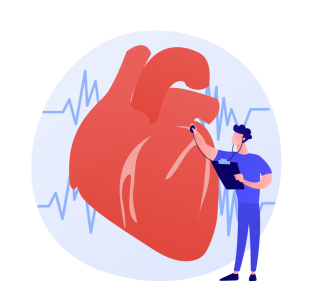Scientists reveal an alarming risk of ‘silent killer’ disease
As people age, health naturally becomes a more central concern, and for good reason. Conditions that were once distant worries can suddenly become immediate threats.
One such condition, which has been dubbed the 'silent killer', is atrial fibrillation (AF or AFib), an irregular heartbeat that can lead to severe complications such as stroke and heart failure.
Recent research from Denmark has revealed a startling statistic: one in three people will develop atrial fibrillation in their lifetime, a significant increase from previous estimates.
Atrial fibrillation is the most common heart rhythm disturbance, and while it can affect adults of any age, it is more prevalent among the older population.
Approximately half a million Australians are affected with this disease, with the highest rates among individuals aged 85 and older.
The reason it's called a 'silent killer' is that many people with AFib do not experience symptoms, leaving them unaware of their risk for serious health events like strokes.
The Danish study, which analysed the health records of over 3.5 million adults, found that not only is the likelihood of developing AFib higher than previously thought, but the condition also significantly increases the risk of heart failure and stroke.
Among those with AFib, up to 40 per cent may develop heart failure, and 20 per cent may suffer a stroke over their lifetime.
What makes atrial fibrillation particularly concerning is that its exact cause remains somewhat of a mystery.
However, it is known to be associated with high blood pressure, which can be a consequence of obesity. With obesity rates climbing in recent decades, it's not surprising that the incidence of AFib is also on the rise.
The symptoms of atrial fibrillation can include heart palpitations, dizziness, shortness of breath, and tiredness.
However, because these symptoms can be sporadic or non-existent, it's crucial to have regular check-ups with your GP, especially if you're over 60.
A normal resting heart rate should be between 60 and 100 beats per minute, but in AFib, the heart rate can be irregular and sometimes much faster.
If you notice a sudden change in your heartbeat or if your heart rate is consistently below 60 or above 100 beats per minute, it's essential to see your GP.
Additionally, if you experience chest pain, seek medical attention immediately.
The Danish researchers emphasised the need for improved treatments to decrease stroke risk and strategies to prevent heart failure among patients with atrial fibrillation.
‘Our novel quantification of the long-term downstream consequences of atrial fibrillation highlights the critical need for treatments to further decrease stroke risk as well as for heart failure prevention strategies among patients with atrial fibrillation,’ the researchers wrote in the British Medical Journal.
They also call for clinical trials and guidelines to better reflect the needs of the real-world population affected by AFib.
Members, it's vital to be proactive about our heart health. Make an appointment with your GP should you feel any of these symptoms:
Source: Heart Foundation/YouTube
In similar news, a study suggested that diet soft drinks may increase your risk of AFib by as much as 20 per cent. You can read more about that here.
 Remember, knowledge is power when it comes to your health. By staying informed and vigilant, you can take steps to reduce your risk of atrial fibrillation and its potentially life-threatening complications.
Remember, knowledge is power when it comes to your health. By staying informed and vigilant, you can take steps to reduce your risk of atrial fibrillation and its potentially life-threatening complications.
What are your thoughts on this story, members? Share them in the comments below.
One such condition, which has been dubbed the 'silent killer', is atrial fibrillation (AF or AFib), an irregular heartbeat that can lead to severe complications such as stroke and heart failure.
Recent research from Denmark has revealed a startling statistic: one in three people will develop atrial fibrillation in their lifetime, a significant increase from previous estimates.
Atrial fibrillation is the most common heart rhythm disturbance, and while it can affect adults of any age, it is more prevalent among the older population.
Approximately half a million Australians are affected with this disease, with the highest rates among individuals aged 85 and older.
The reason it's called a 'silent killer' is that many people with AFib do not experience symptoms, leaving them unaware of their risk for serious health events like strokes.
The Danish study, which analysed the health records of over 3.5 million adults, found that not only is the likelihood of developing AFib higher than previously thought, but the condition also significantly increases the risk of heart failure and stroke.
Among those with AFib, up to 40 per cent may develop heart failure, and 20 per cent may suffer a stroke over their lifetime.
What makes atrial fibrillation particularly concerning is that its exact cause remains somewhat of a mystery.
However, it is known to be associated with high blood pressure, which can be a consequence of obesity. With obesity rates climbing in recent decades, it's not surprising that the incidence of AFib is also on the rise.
The symptoms of atrial fibrillation can include heart palpitations, dizziness, shortness of breath, and tiredness.
However, because these symptoms can be sporadic or non-existent, it's crucial to have regular check-ups with your GP, especially if you're over 60.
A normal resting heart rate should be between 60 and 100 beats per minute, but in AFib, the heart rate can be irregular and sometimes much faster.
If you notice a sudden change in your heartbeat or if your heart rate is consistently below 60 or above 100 beats per minute, it's essential to see your GP.
Additionally, if you experience chest pain, seek medical attention immediately.
The Danish researchers emphasised the need for improved treatments to decrease stroke risk and strategies to prevent heart failure among patients with atrial fibrillation.
‘Our novel quantification of the long-term downstream consequences of atrial fibrillation highlights the critical need for treatments to further decrease stroke risk as well as for heart failure prevention strategies among patients with atrial fibrillation,’ the researchers wrote in the British Medical Journal.
They also call for clinical trials and guidelines to better reflect the needs of the real-world population affected by AFib.
Members, it's vital to be proactive about our heart health. Make an appointment with your GP should you feel any of these symptoms:
- have breathing problems
- feel dizzy or lightheaded
- have heart palpitations (this may feel like your heart is racing or beating too fast)
- feel weak or tired
- have chest pain or discomfort
- have difficulty exercising
Source: Heart Foundation/YouTube
In similar news, a study suggested that diet soft drinks may increase your risk of AFib by as much as 20 per cent. You can read more about that here.
Key Takeaways
- One in three individuals is at risk of developing atrial fibrillation, a condition which can lead to strokes and is often labelled a 'silent killer'.
- Danish researchers found that up to 40 per cent of those with atrial fibrillation might develop heart failure, and 20 per cent are at risk of suffering a stroke.
- Health experts stressed the importance of prioritising heart failure prevention strategies and treatments to reduce the risk of complications associated with atrial fibrillation.
- The study emphasised the need for clinical trials and guidelines that address the real-world implications of atrial fibrillation and its increasing prevalence.
What are your thoughts on this story, members? Share them in the comments below.








